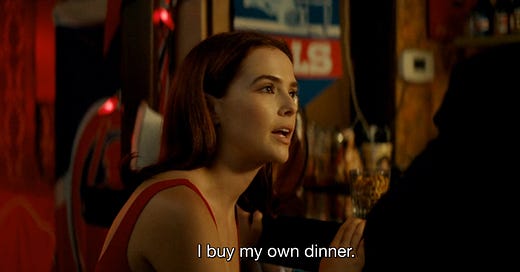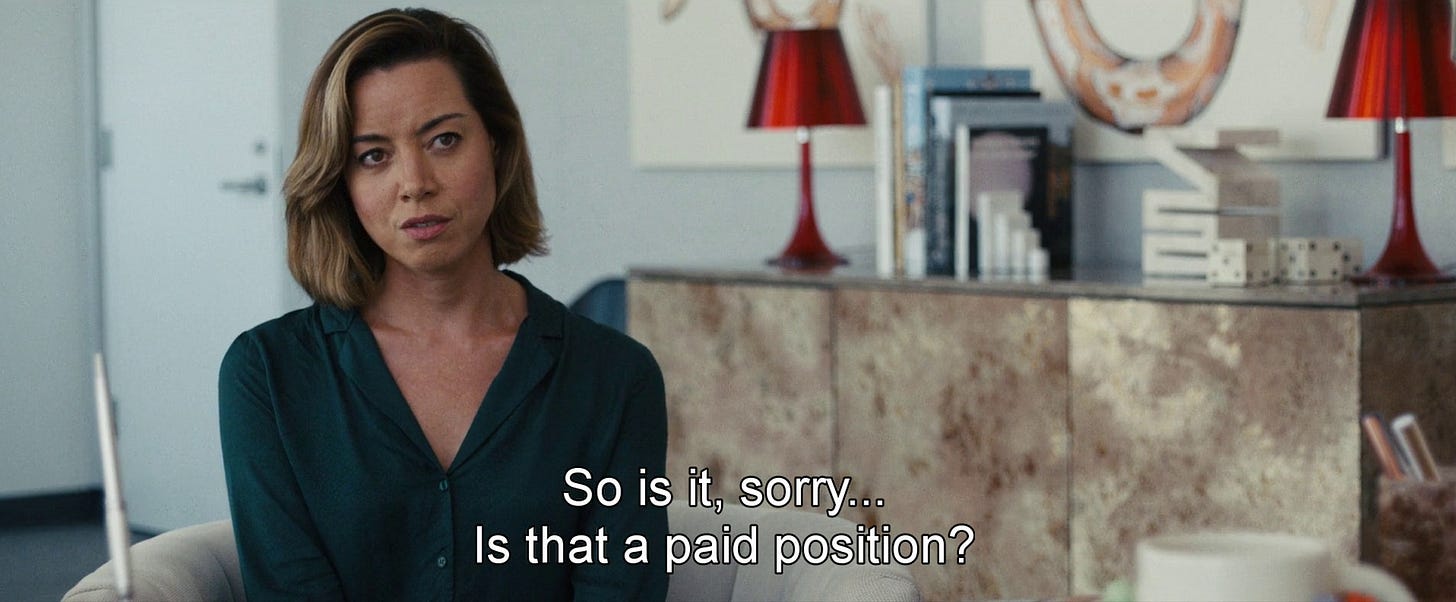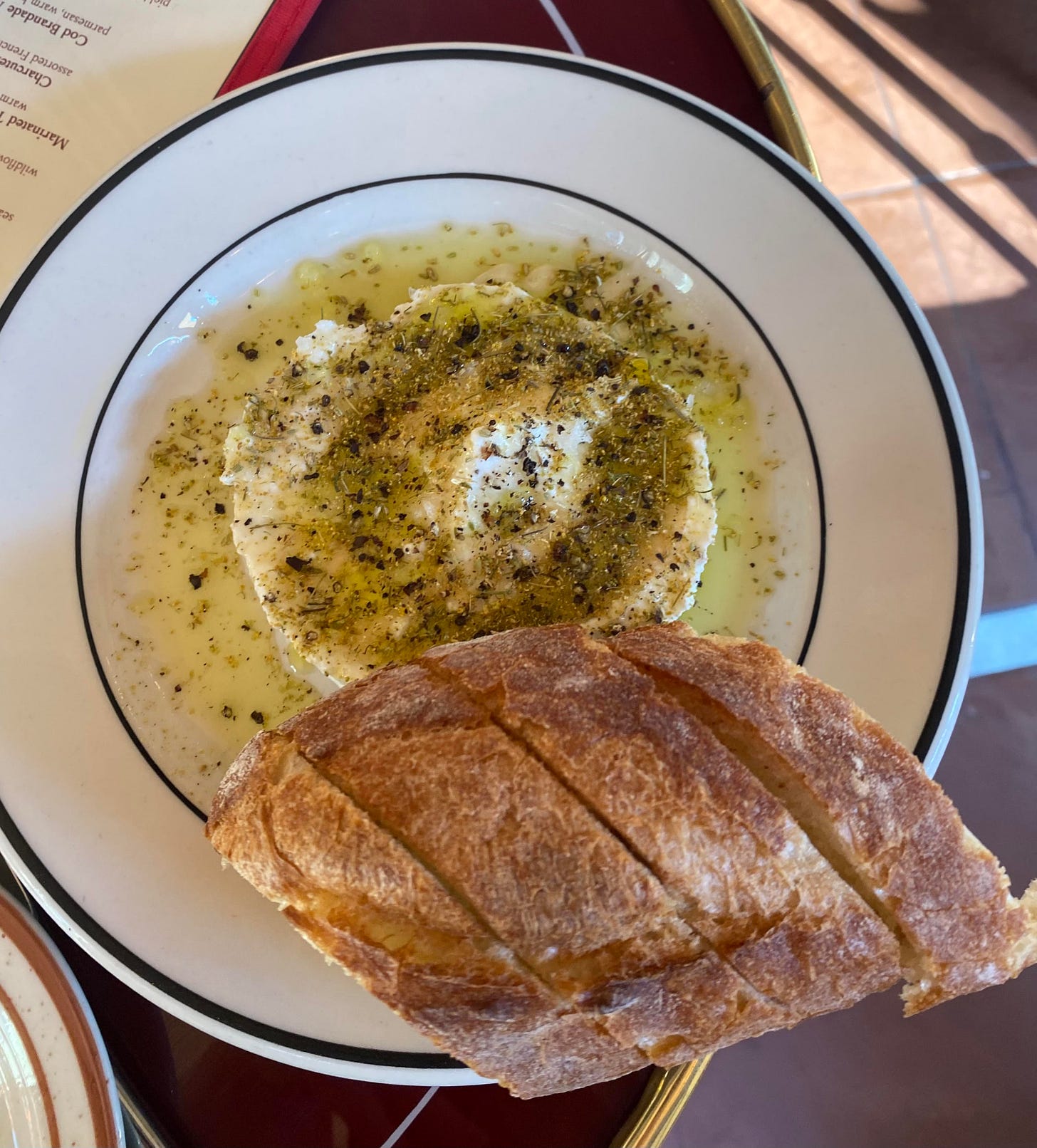Something’s been bugging me. In a culture that venerates success and individual achievement, the image of the girlboss has become a staple of our times, featuring into movies dating back to Melanie Griffiths in Working Girl (1998). Taking on the traits typically associated with men, these women commandeer the workplace, displaying a level of ambition and ruthlessness that can be both admirable and unsettling.
The deathknell of the girlboss has sounded though, owing to how its intrinsic white feminism becomes justification for greed and self-interest—all fair and good, except I'd argue we haven't seen these women go the full mile of their male counterparts, especially regarding the crossroads of business and fraud, extending themselves too far into the avarice to let it warp them into something evil. (When it comes to conniving women on screen, it always goes back to sex, which is why the erotic thriller holds such significance.)
To that end, here are three films, notably flawed, that have stuck with me in their depicting the narrow scope and progression of a female con artist. Spoilers ahead for all.
Buffaloed
Tanya Wexler, 2019
Zoe Deutch plays Peg, a homegrown hustler who is savvier than the boys. Newly accepted to the Ivy League, but unable to afford it, she reaps the sales of scalping football tickets and pays with jail time. Re-enrolling isn’t reconsidered, higher education dropped from the question, because in Buffalo, a “city whose favorite meal is a discarded chicken part,” fates aren’t contested, merely accepted. What else to expect in a city hopelessly dedicated to that staple of disappointment known as the Bills.
Peg slaloms to beat the rat race the only way possible when you're squeezed between a rock and a hard place: preying on the weak. She gets into the local debt settlement game, pitching the allure of financial freedom through the landline, and recruiting other aspirants in the process. A natural schmoozer, Peg’s good at what she does, and so is Deutch, good enough to fleece us out of 90 minutes in what’s a half-strength character study.
Deutch talks a smart and fast game, nattering like a 21st century Kathryn Hepburn or Sandra Bullock. Jennnifer Lawrence also made a bid for this persona with her turn in David O’Russell movies, but it didn’t quite take. The difference: Deutch’s girl-next-door mug and cherub cheeks lend her a more malleable and comedic edge, though here she’s been I Tonya’d, brassified and graveled for that hard-on-your-luck look. Small town folk, as this movie would have it, are lovingly craven and woefully behind the times—ambrosia salad’s still en vogue.
Buffalo’ed is far from a scathing take on capitalism but revealing in its attitudes, as it ultimately punishes an enterprising young woman for her unyielding determination. Peg’s mother (Judy Greer) and brother, while supportive of her dreams, wish she would settle for eking it out like the rest of them. Peg’s hustler bravura, her perky mettle evinced as she tries to take down a rival firm, is a character flaw, a sign of her eventual demise. Rather than lean into these anti-heroine qualities, the movie relents to moral instincts and “goodness,” depriving us of a female Walter White, a Shiv Roy Succession-sister, or Jordan Belfort-naif.
In fact, more than one critic compared this movie to the Wolf of Wall Street, and Peg, like Leo, gleefully breaks the fourth-wall to supply the occasional financial explainer. But holding up this movie, an indie-budget Tribeca find, to Scorsese’s late-capitalist behemoth is unproductive and misguided. The film Buffaloed more resembles is O’Russell’s Joy, where the aforementioned J-Law plays a real-life HSN goddess who invented a retractable mop and similarly aspired to transcend the confines of her small town. Deutch’s character, like Lawrence’s, pays for her sins and eventually rebuilds—but, the male movie-equivalent though would've stopped running. Fictional Peg does a full 40 months in jail for scalping tickets; the real life Wolf of Wall Street was released after only 22.
I CARE A LOT
J. Blakeson, 2020
Rosamund Pike, continuing her Gone Girl/bad girl streak plays Marla, a high-class con artist running a legal guardianship scam. Aided by equally unscrupulous physicians , she dupes the elderly into her care at her assisted living facility while she saps their funds and sells their assets.
Unlike Peg, the coldly calculating Marla draws on an exacting cruelty and a sophisticated aura of professionalism. Her razored bob and impeccable posture, coupled with an unwavering death stare, personify the very essence of a female antagonist, the ruthless HBIC who can stand shoulder-to-shoulder with her male counterparts. She even dates a woman, an underwritten storyline that feels concocted solely to heighten her mystique, another narrative checkbox towards complicating the standard narrative of white feminism.
It’s hard to root for Marla—her blithe, blinding greed, her caustic lack of remorse, her tyrannically sunny power suit and blinding white sneakers—and I'm not sure whether you’re meant to. More compelling are her foes, an ex-mobster played by Peter Dinklage whose human side is relayed through a loves French pastry rivaled only by his affection for dear mother (Dianne Wiest, imprisoned in this role) who has the misfortune of becoming one of Marla's wards.
Even as they’re sketched as problematic and corrupt, Marla remains a withering, hollow vessel of greed. The final act attempts, unconvincingly, to round out her character with sympathies, as well as feats of supernatural strength. Stolidly energized by a bankrupt world, the film offers a critique of a broken system, ripe for exploitation, but this feels less like a conscious choice than a convenient one. Marla’s impromptu assassination is tidy retribution, morally deserved, but cinematically frustrating.
And that brings us to Aubrey Plaza…
EMILY THE CRIMINAL
John Patton Ford, 2022
Unable to find a salaried employment from a past mistake, art school grad Emily (Aubrey Plaza, who has proven she can act but here leans too heavily into “being from NJ”) becomes an independent contractor, hauling corporate lunches up to droning wages slaves. In a world where student debt cancellation would still leave her owing a sizable amount, she finds a faster fix by breaking the law. Her colleague tips her off to a dummy shopping ring, where she buys high-value goods with fake credit cards. The opposite of nonchalant, it takes her a while to get used to—and that makes watching Emily the Criminal a dull suspense. This is a wan thriller, the mediocre execution of which nearly matches the amateurishness of Emily herself.
A burgeoning romance between Emily and her handler Youcef (Theo Rossi) an Lebanese American immigrant similarly blocked from the American Dream, provides narrative cushion, but the film’s visual inertia undermines the tremendous significance of the story, particularly its ending: A response to both the prevailing student debt crisis and the economic climate of our times Emily the Criminal presents, all too gently, a last-resort self-sufficiency and the genesis of a kingpin.
GIRL DINNER
At worst a euphemism for a flimsy meal grounded in dietary discipline and at its generous best an Americanized mezze, the girl dinner finds its natural dwelling place in none other than the today’s natural wine bar, serving miniature assemblages of the raw and cold and cured. When I personally first heard the term I thought immediately, perhaps reductively of something sweet eaten in guise of a balanced meal. If boys are picking at cold cuts hard plastic packaging, then it’s only logical that girls are pawing at slabs of cake and handfuls of cookies under a lack of judgment and supervision... (This theory bleeds into my guilty pleasure, a girl breakfast of sorts: the warm pocketable indulge of a snickerdoodle or brownie to face the workday)
At Caleta on Avenue A, you can actually have both. The usual suspects—raw bivalves, shrimp cocktail, pan con tomate—sit alongside voluptuous ice cream sandwiches, made with the in-house Bad Habit, in perfectly calibrated entropy, cementing this wine bar as the ultimate girl dinner destination.
More food for fodder:
Ensconce yourself in people-watchers and revelers at Le Dive with radishes and butter, ricotta and baguette, and a glass of pet-nat. Rest assured, everyone’s having too much fun to scrutinize you at this sceney spot.
Allium-laden focaccia is a perennial menu-item at King Mother, a convenient pitstop and oasis, really, while ogling the neat little houses in Victorian Flatbush.
The delicately fizzy, full-bodied bevvies from De Soi, the NA aperitifs brand founded by…Katy Perry. Contrary to the product’s intended use, I prefer to take mine—like the brisky and zesty Golden Hour, the cherried Champignon Dreams—with a double spot of espolon.
Nab one slice of buttermilk chess and one slice of peach with a thatched butter crust, heretofore known as the seasonal twin-set of pies, from Four and Twenty Blackbirds while you can.
Homey yet inspired is the name of the game from By Clio in Gowanus, a veritable trove of spin-the-wheel flavor combinations that mostly work: a hojicha brownie, a burfi iteration flecked with cardamom and pistachio, a tandoori masala chip cookie, and cakes by the slice, like graham cracker stuffed with blueberries and frosted with honied Greek yogurt; Thai iced tea crowned with rosemary; a purple chicha morada.
Everyone knows the best pastry/sweets case in Brooklyn is Ciao Gloria, though I occasionally cheat on them for some baci and frolle cookies from Gran Caffe de Martini across the street.
Among flowers and fruits and everything else, Jean George’s Tin Building sells a preposterously divine banana cookie: the brown-butter batter, dotted with poppy seeds, is redolent of the humble fruit, and inscribed with a caramelized oblong slice (not coin!) of it.
If you can navigate Calatrava’s 2001 airplane hangar that is the Oculus, reward yourself with delightfully crinkled purple ube cookie from Two Geese Bakery,
Subjected to a never-ending series of spon-con from Seven Grams Caffe, I caved to find the improbable Goldilocks ideal of a chocolate chip cookie, not too soft, not too hard, a casual alternative to now crisped cookie-cake textures du jour.











This note about I Care A Lot is reminding me of this nagging curiosity I had about Tar after I watched it last month: was it necessary or lazy to make her a lesbian in order for her to be a masculine egomaniac?